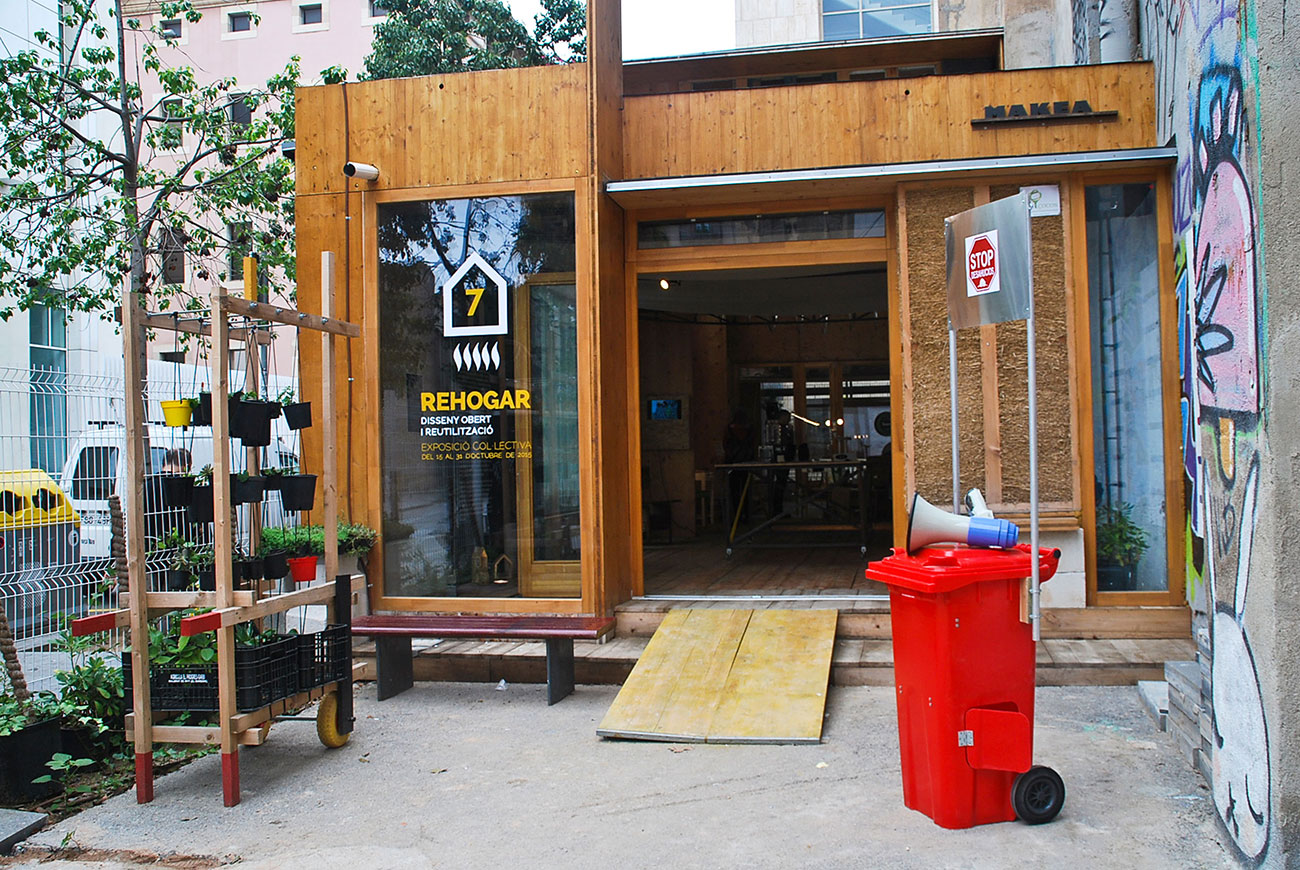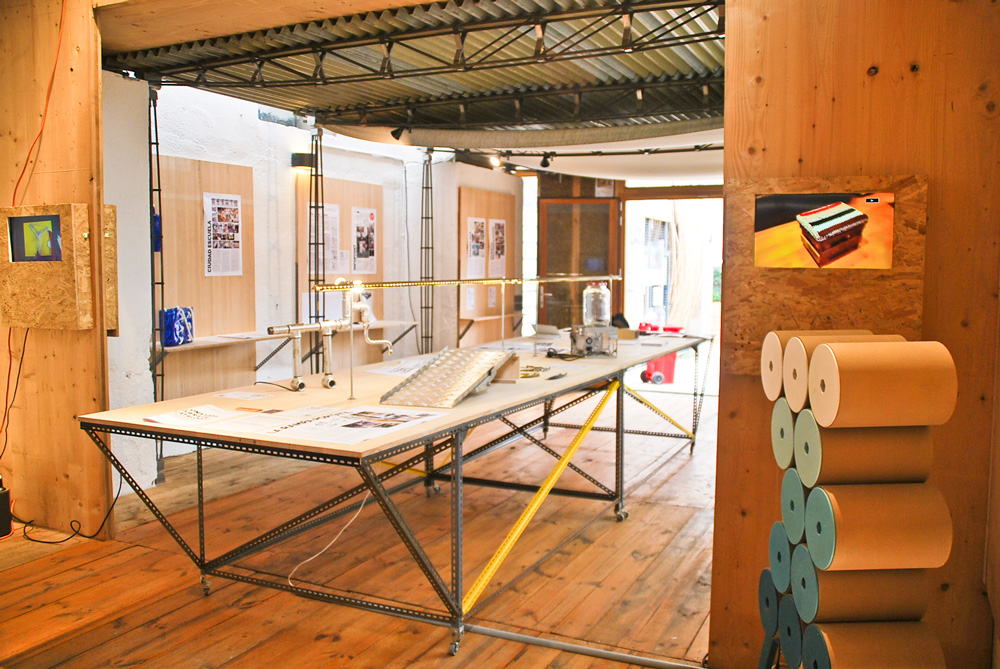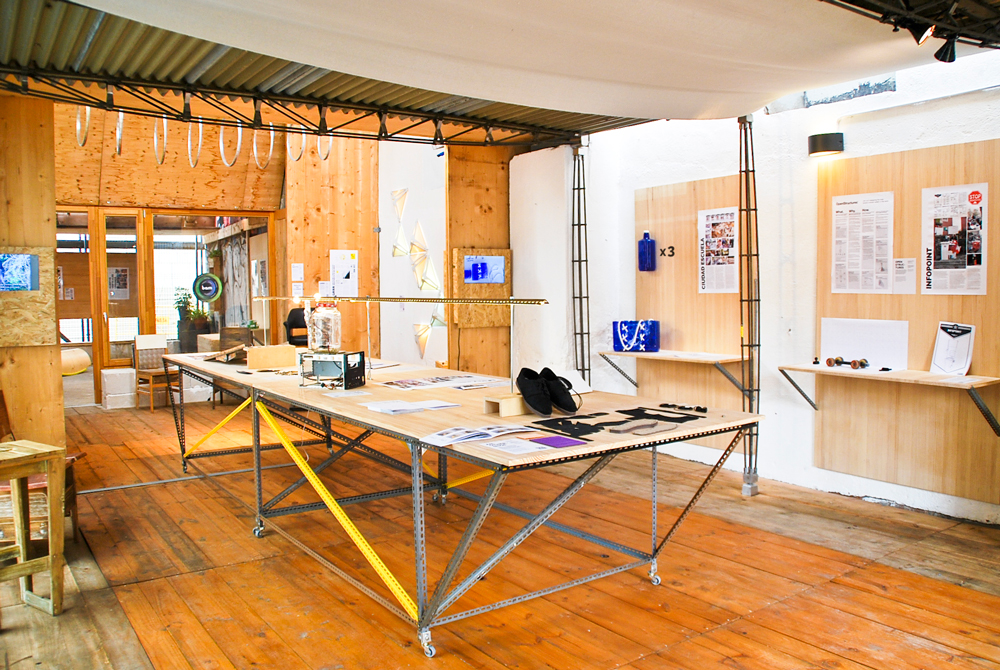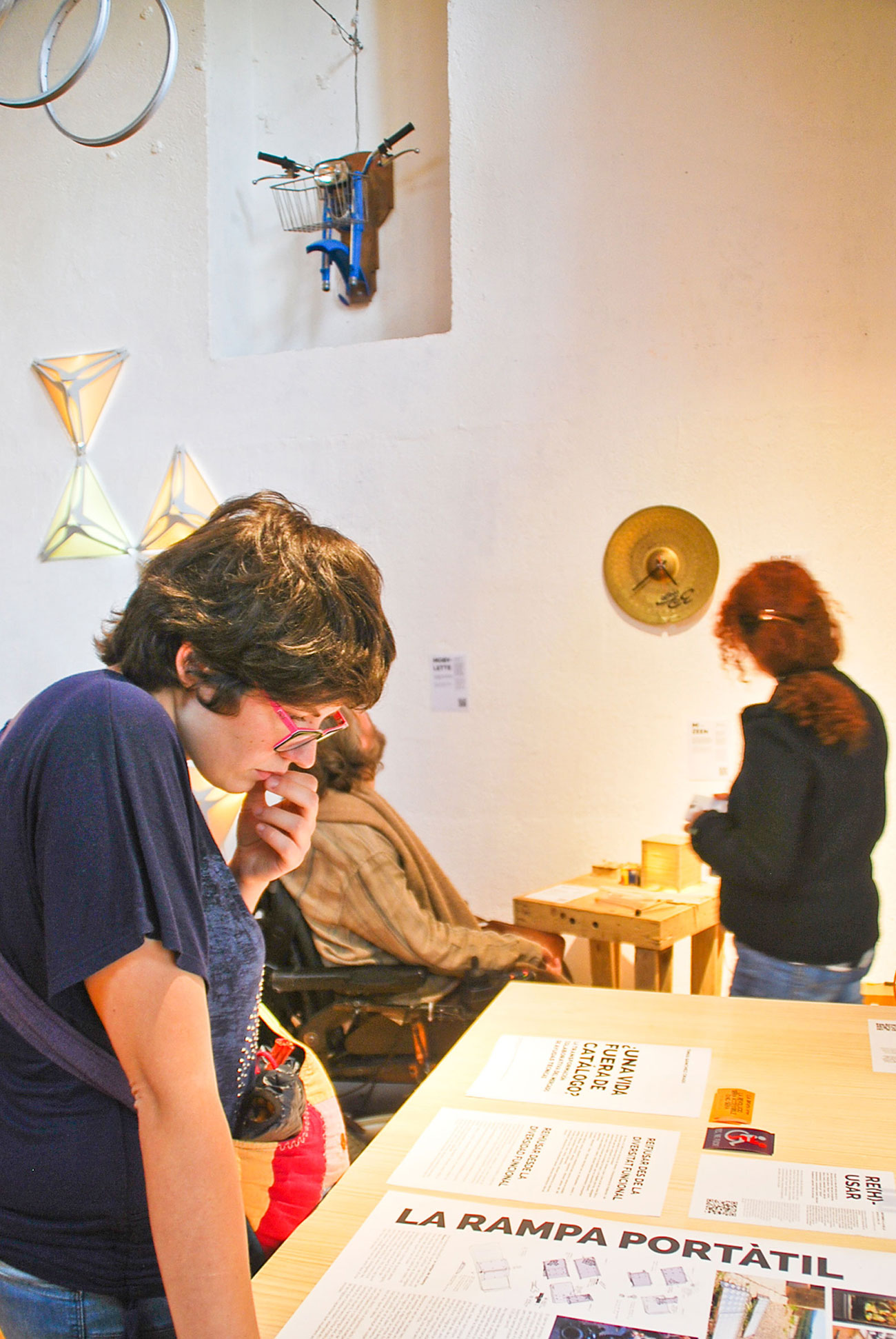
Imagen CC BY, tomada de Wikimedia Commons
Existen diferentes formas, a veces incluso inconmensurables, de “hacer cuerpo”, de construir saberes en torno a él. Pero también hay distintas maneras de no poder hacerlo, o de no poder hacerlo de la misma manera, de no encontrar modos de componerlo. Incluso diferentes modos de no saber ni cómo “hacerse” un cuerpo…
Para intentar ejemplificar, permítaseme la osadía de la autobiografía: tan peligrosa por sus modos de construir legitimaciones y posiciones de privilegio en ese ser capaz de decirse y narrarse; un modo narrativo difícilmente disputable, pero a la vez tan frágil y disputado por su incapacidad para argumentar y convencer ante un auditorio cientificista. No le llamemos autobiografía, pues. Digamos, más bien, que quisiera poner mi propia experiencia de hacer cuerpo para pensar colectivamente sobre ella… Bueno, el caso es que hay días que me levanto hecho polvo por la alergia. No creo ser un caso extremo ni especialmente grave, pero hay noches que me cuesta dormir por los mocos o que me levanto en mitad de la noche un poco ahogado con lo que espero que no sea más que un principio de asma, algo que la mayor parte de las veces resuelvo con un pequeño chute de mi inhalador, que he aprendido a tener cerca de mí como un fetiche desde pequeño. Aunque otros días, sobre todo cuando me levanto cansadísimo por una noche toledana, siempre pienso en esa frasecita del acervo popular: “el cuerpo es sabio”, que comúnmente suele proferirse para indicar que el cuerpo sabe más de lo que parece sobre lo que le aqueja, y que sólo tendríamos que escucharlo un poco más.
Queremos pensar desde la experiencia, pero la experiencia a veces es muy compleja. Como he estado a punto de quedarme en el sitio alguna que otra vez me darían ganas de reírme al oír esta expresión (más de miedo que de otra cosa), porque si tuviera que contar únicamente con la sabiduría de mi propio cuerpo sobre sí mismo no sé ni dónde estaría a estas alturas. Desde los 4 años y, tras algunos buenos sustos de mis padres, he aprendido gracias a la ayuda de diferentes profesionales sanitarios a reconocer mis sensaciones a través de infinidad de pruebas como tests de reacción o espirometrías; y he aprendido a contarme y notarme como un ente excesivamente sensible y cuyo sistema inmunitario reacciona de forma desmesurada –aunque a baja intensidad, afortunadamente– a la presencia ambiental de pequeñas partículas de polen, ácaros u hongos, que he aprendido a nombrar alérgenos y que no “veo” hasta que no me noto un picor intenso por todo el cuerpo, irritación en ojos y nariz, tengo muchos mocos espesos o me falta el aire.
Con una cierta frecuencia llevo a cabo ciertos rituales de prevención farmacológica y ambiental que me han enseñado desde pequeño a través de manuales o folletos (y más recientemente consultando páginas web oficiales u otros medios). Por ello, y no sin una magna pereza que muchas veces no venzo, además de tomarme mis pastillas: (1) reviso los “boletines aerobiológicos” de mi zona, donde grosso modo me cuentan los niveles de concentración de ciertas partículas en el aire para ver si tengo que estar especialmente alerta; (2) e intento mantener una higiene básica de mi dormitorio, debatiéndome –sobre todo cuando he vivido en ciudades húmedas–, en épocas de gran polinización entre ventilar y sufrir de lo que hay fuera, o cerrar y padecer de los efectos de los ácaros.
Claro, si inventáramos un medidor universal de sufrimiento planetario, y si lo sumamos a otras condiciones socio-económicas, seguramente yo sufro poco: en intensidad, en cantidad, en frecuencia o en momentos. Pero lo suficiente para que no se me olvide nunca mi fragilidad ni la sutil infraestructura de relaciones, saberes y tecnologías que me ayuda a mantenerme con vida. Más que “tener un cuerpo” si acaso no soy más que un cuerpo que participa de un grandísimo enjambre de modos de “ser tenido” o “sostenido”. Gracias al sostén del que me proveen diferentes colectivos, más o menos instituidos, que han dedicado su vida a construir conocimiento sobre cuerpos como el mío, poniéndolo en circulación y materializándolo en terapias y tecnologías (véase Mol, 2002), hasta el momento he podido permanecer relativamente estable y seguir haciendo mis cosas.
Pero en este relato es imposible olvidar que los modos de hacer cuerpo o, mejor dicho, estas infraestructuras corporales están atravesadas por distribuciones diferenciales del sufrimiento y la violencia (Butler, 2004). Quizá pueda decir, no sin un cierto resquemor, que tengo la suerte de que mi dolencia ha podido ser resuelta con una cierta sencillez gracias a la industria farmacéutica y puedo acceder a compuestos farmacológicos relativamente baratos, como los antihistamínicos, la budesónida o la terbutalina, que me permiten salir adelante. Pero, ciertamente, el acceso a fármacos y el poder experto que los gobierna y que hace de llave de paso para su dispensario (Petryna, Lakoff & Kleinman, 2006) es, para otros muchos modos de hacer cuerpo o de intentar hacerlo, un verdadero problema, ya sea por la dificultad económica para su acceso o por la inexistencia de un compuesto apropiado.
Pero quisiera ir al margen de mí –no soy importante en esta historia– e incluso más allá de la experiencia de la enfermedad. Mi intención con este relato es intentar poner en evidencia que quizá uno de los principales asuntos a dirimir a la hora de pensar desde la experiencia es un tema de infraestructuras corporales. Me explico: no ya sólo de una red de relaciones entre artefactos y saberes, sino de que quizá el cuerpo sea un asunto infraestructural. Porque no hay un cuerpo al margen de todo el ejercicio de montaje de diferentes infraestructuras que permiten que esos cuerpos puedan ser puestos en común, si es que lo consiguen. Infraestructuras que permiten o limitan que alguien se componga como cuerpo “homologable”, llevando vidas más o menos vivibles, o convirtiendo nuestra vida en un calvario al estar esta infraestructura corporal sometida a un problema de complejidad, por articular una relación abyecta o in-componible. Pero eso no quiere decir que esté todo dicho…
Activismo encarnado y la política del conocimiento sobre el cuerpo

Imagen CC BY, tomada de Wikimedia Commons
Precisamente porque todos somos “(sos)tenidos” por una complejísima madeja de interdependencias que nos “(sos)tiene” con vida a pesar de ser tan frágiles, nos haríamos un flaco favor si no consideráramos la larga historia de disputas en torno al conocimiento sobre el cuerpo, aunque sólo sea la sutil e insidiosa violencia de que algunas personas son tenidas peor que otras, en muchos casos por los propios basamentos ideológicos o epistemológicos sobre qué entendemos debiera de ser un cuerpo y para qué debiera de servir.
Como nos recuerdan distintas sensibilidades feministas y trabajos vinculados conmovimientos anti-racistas o los colectivos LGBT, la medicina y ciencias afines han sido en muchos momentos no sólo ciencias de la salud pública, sino grandísimas máquinas de producción de discriminación racista, sexista, edaísta y capacitista sobre unos cuerpos “patologizados” y tratados como “raros”, “enfermos”, ”diversos” o “no-normativos” (véase Coll Planas, 2011) con respecto al patrón antropométrico del varón blanco, heterosexual de mediana edad y capaz. Pero también máquinas del olvido para esos cuerpos que sufren “sin sentido” porque sus síntomas o sus problemas no cuadran con la particular forma de construir saberes y tomar decisiones de nuestras instituciones sanitarias, y quedan sistemáticamente fuera, cuerpos extranjeros en su propia tierra.
Quizá por ello tiene un enorme sentido prestar atención a los diferentes modos en que un cuerpo puede o no ser puesto en común. Pero la puesta en común no es fácil, y no se puede hacer asumiendo que existe lo “en común” o “lo común”. No son pocos los casos (véase Lafuente, Alonso & Rodríguez, 2013) en los que diferentes comunidades de afectados por un algo que progresivamente se vislumbra como un mal común (como las famosas intoxicaciones masivas por el aceite de colza o las malformaciones fetales causadas por la ingesta de talidomida; por no hablar de los efectos tóxicos del llamadodesastre de Bhopal -analizados por Fortun, 2000- o las consecuencias sanitarias derivadas del accidente de Chernóbil -relatadas por Petryna, 2002-) o grupos de personas que poco a poco se descubren trabajosamente aquejadas por algo muy parecido, originariamente ignoto, necesitan realizar muchos esfuerzos por mostrar y demostrar que lo que les ocurre es cierto o para intentar intervenir la manera en que son tratadas por los sanitarios.
Muchas de estas personas acaban abocadas a llevar a cabo diferentes proyectos de “activismo encarnado”: esto es, en palabras de Israel Rodríguez Giralt a desarrollar “forma[s] de acción asociativa cada vez más influyente que politiza la propia experiencia para convertirla en objeto de controversia política”. Esto se hace de muchas maneras, llegando en ocasiones a construir o proveer de evidencia de lo que les aqueja y cómo debieran de ser tratadas. Pero casi siempre suele suponer una politización de la propia experiencia corporal ya sea para contradecir, contrapuntear, matizar o enrolar a otros, en muchos casos a los profesionales que “gestionan” sus situaciones o les atienden. Un buen ejemplo sigue siendo el trabajo de politización corporal desarrollado por los afectados por el VIH de ACT-UP en los 1980 y 1990: que reclamaban el control sobre sus propias vidas, defendiendo su derecho a que no se les tratara con placebo en ensayos clínicos, puesto que del tratamiento para todo el mundo dependía su vida (Epstein, 1996).
Pero también existen innumerables ejemplos de esos colectivos que necesitan articular formas de “contra-experticia”, desarrollando formatos de vindicación de “su propia experticia sobre su experiencia” frente a “los expertos en la experiencia de los otros”. Particularmente interesantes de entre estas dinámicas son los que Antonio Lafuente denomina formatos de “ciencia colateral”: esa ciencia hecha con los desechos, que produce conocimiento con lo desechado por los saberes institucionalizados y que, al hacerlo, produce la apertura de la naturaleza del conocimiento sobre lo corpóreo a nuevos horizontes.
Aunque también existen casos de grupos de personas sometidos a una creciente y prolongada agonía en tanto sus dolencias no son consideradas o componibles desde algunas infraestructuras de saberes, técnicas y artefactos hegemónicos. Un buen ejemplo de esas luchas sería la que protagonizan personas aquejadas por lo que se conocen como síndromes de sensibilidad central (entre las que se suele agrupar lafibromialgia, la sensibilidad química múltiple o el síndrome de fatiga crónica), que han venido siendo materia de debate público en épocas recientes al intentar diferentes grupos de presión que fueran consideradas enfermedades que dieran derecho a una pensión, para lo que numerosas de las personas aquejadas han venido produciendo relatos narrativos y audiovisuales sobre sus problemas para ser creídas, sobre las dificultades para probar lo que les ocurre, sobre su incapacidad de trabajar y las enormes diatribas a las que se enfrentan para acondicionar o adaptar sus hogares de un modo que les permita vivir algo mejor (véase los relatos autobiográficos de Caballé, 2009 y Valverde, 2009; pero también el ensayo de Murphy, 2006).
Potenciales y límites de un cuerpo (en) común

Imagen CC BY, tomada de Wikimedia Commons
Estos movimientos o colectivos que desarrollan innumerables prácticas de activismo encarnado traen a la presencia la necesidad de pensar y reflexionar largamente sobre los modos en que se crea, comparte y valida el conocimiento experiencial y existencial o “sobre lo que nos pasa”. Pero ¿qué hacer con estas afecciones que, como comentan las personas que la padecen, son “enfermedades de la normalidad”? Formas de hacer cuerpo que ponen en crisis nuestros modelos de trabajo, conocimiento instituido o consumo industrial:
“Nosotros, los enfermos de normalidad, somos una anomalía. Un error del sistema. Y lo que más deseamos, por encima de todo, es que este lo pague caro. Nuestra verdad es la verdad del mundo. De su funcionamiento. El cuerpo enfermo de fatiga se inscribe en el interior de un nuevo tipo de politización más existencial que, por un lado, instituye una verdad capaz de producir un desplazamiento y, por otro lado, converge con la práctica política de la fuerza del anonimato” (López Petit, 2014: 75).
A buen seguro podríamos expandir la reflexión sobre estos problemas a colectivos como los desahuciados arrojados al vacío sin hogar, los parados condenados en vida a ser una exterioridad irrecuperable, los refugiados sirios entre el fuego cruzado y el neo-fascismo de la Europa cristiana, las cuidadoras inmigrantes atrapadas en condiciones de precariedad sin voz ni voto… ¿Cómo componer otras relaciones con estos cuerpos “abyectos”, como los llama Murphy (2006)? Abyectos no sólo porque pongan en duda aspectos morales o normativas para otras capas de la población, sino porque ponen en crisis o disputarían nuestras formas de “saber articular un saber sobre ellos”, pero también de pensar la política: son cuerpos en muchas ocasiones agónicos que quiebran el modelo heroico de la agencia, ya sea en la versión individual-liberal o colectiva-activista. ¿Cómo articular otros modos de relación con ellos que huyan del paternalismo o del buenismo con que ciertas formas de caridad o de gestión tecnocrática han podido desarrollar? ¿Cómo podrían estos cuerpos traer consigo no sólo una condición abyecta sino esperanzadora sobre cómo articular infraestructuras corporales más en común donde generemos un cierto cuidado que permita nivelar las asimetrías?
En su reciente libro De la necropolítica neoliberal a la empatía radical, Clara Valverde (2015) aboga con acierto por la construcción de “espacios intersticiales” que permitan una alianza de los cuerpos comúnmente excluidos por las dinámicas económicas, epistémicas y políticas contemporáneas. Es más, en una reciente entrevista, llega a sugerir que:
“Las iniciativas, ideas y grupos implicados en lo común son el antídoto contra la necropolítica. Lo que el poder absoluto quiere dividir, nosotros lo tenemos que juntar. Nos tenemos que juntar enfermos, sanos, trans y todos los géneros, razas varias, ancianos, niños…”
Pero los innumerables fracasos o fragilidades permanentes para articular una infraestructura corporal (recordemos, relacional, de saberes, artefactos) con un grado de institucionalización estable de muchos colectivos y grupos que están últimamente intentando esto (pienso, por ejemplo, en un caso cercano: la #redcacharrera: 1 | 2 | 3), nos indican que sabemos muy poco de cómo hacer estas infraestructuras corporales en común, o que existen muy pocas condiciones para que devengan infraestructuras per se. Y no hay más remedio que poner en el centro de la discusión el marasmo de condiciones –no sólo circunscritas a la supuesta “lógica neoliberal” o a los modos de precarización de la austeridad, sino también a la elevada intensidad del sostenimiento relacional activista y a ciertas de sus lógicas implícitas, que nos impiden prestar atención a ciertas otras cosas, o la falta de costumbre, hábito y tiempo para hacerlo, etc.– que nos privan de toda posibilidad de poder explorar, analizar, detallar y encontrar saberes y modos de registro, espacios y métodos de encuentro, así como formatos institucionales (ya sean públicos o no), legales y económicos sostenibles para poner en común lo que nos pasa, para poder construir la jurisprudencia sobre nuestros cuerpos diversos. Unas condiciones extremadamente frágiles que hacen más complicado aún si cabe articularse con cuerpos “todavía-no” o “no-fácilmente” en común, o prestar atención a la enorme cantidad de experiencias encarnadas “en el umbral”.
Aunque nos falte el tiempo, aunque estemos sin fuerzas, necesitamos hacer un sitio importante en nuestros aprendizajes cotidianos a la exploración pormenorizada de qué permite y qué no construir infraestructuras no ya sólo para cobijar esos cuerpos (Biehl & Petryna, 2011), sino también analizar, poner en palabras y compartir diferentes modos prácticos de sostenernos de formas más horizontales y en común (Butler, 2015), sin dejarnos abatir por el hecho de que la mayor parte de las veces nuestras experiencias serán difícilmente componibles o explicables.
Referencias
Biehl, J. & Petryna, A. (2011). Bodies of rights and therapeutic markets. Social Research: An International Quarterly, 78(2), 359–386.
Butler, J. (2004). Precarious Life: The Powers of Mourning and Violence. London: Verso.
Butler, J. (2015). Bodily Vulnerability, Coalitional Politics. En Notes Toward a Performative Theory of Assembly (pp. 123-153). Cambridge, MA: Harvard University Press.
Caballé, E. (2009). Desaparecida: Una vida rota por la Sensibilidad Química Múltiple. Barcelona: Viejo Topo.
Coll Planas, G. (2011). El género desordenado: Críticas en torno a la patologización de la transexualidad. Barcelona: Egales.
Epstein, S. (1996). Impure Science: AIDS, Activism, and the Politics of Knowledge.Berkeley, CA: University of California Press.
Fortun, K. (2001). Advocacy After Bhopal: Environmentalism, Disaster, New Global Orders. Chicago: University of Chicago Press
Lafuente, A., Alonso, A. & Rodríguez, J. (2013). ¡Todos sabios! Ciencia ciudadana y conocimiento expandido. Madrid: Cátedra.
López Petit, S.(2014). Hijos de la noche. Barcelona: Bellaterra.
Mol, A. (2002). The body multiple. Ontology in Medical Practice. Durham: Duke University Press.
Murphy, M. (2006). Sick Building Syndrome and the Problem of Uncertainty: Environmental Politics, Technoscience, and Women Workers. Durham, NC: Duke University Press.
Petryna, A. (2002). Life Exposed: Biological Citizens after Chernobyl. Princeton, NJ: Princeton University Press.
Petryna, A., Lakoff, A.& Kleinman, A. (Eds.). (2006). Global Pharmaceuticals: Ethics, Markets, Practices. Durham, NC: Duke University Press.
Valverde, C. (2009). Pues tienes buena cara. Síndrome de Fatiga Crónica, una enfermedad políticamente incorrecta. Barcelona: Martínez Roca.
Valverde, C. (2015). De la necropolítica neoliberal a la empatía radical: Violencia discreta, cuerpos excluidos y repolitización. Barcelona: Icaria.
Agradecimientos
Dedicado a mis compas En torno a la silla: Alida Díaz, Nuria Gómez y Silvia Sanz que me han ayudado a revisar un texto largamente en el tintero y a no olvidar muchos modos distintos de poner el cuerpo en el centro. Con un agradecimiento especial para Antonio Lafuente, que me ayudó a aprender a afectarme por la idea del “cuerpo común”.

















